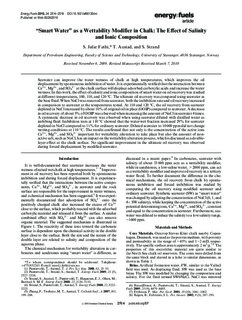| dc.contributor.author | Fathi, Seyed Jafar | |
| dc.contributor.author | Austad, Tor | |
| dc.contributor.author | Strand, Skule | |
| dc.date.accessioned | 2013-07-23T13:25:27Z | |
| dc.date.available | 2013-07-23T13:25:27Z | |
| dc.date.issued | 2010 | |
| dc.identifier.citation | Fathi, S J., Austad, T., Strand S. (2010) “Smart water” as a wettability modifier in chalk: The effect of salinity and ionic composition. Energy & Fuels 24(4), pp. 2514–2519 | no_NO |
| dc.identifier.uri | http://hdl.handle.net/11250/183218 | |
| dc.description | "Reprinted (adapted) with permission from Fathi, S J., Austad, T., Strand S. (2010) “Smart water” as a wettability modifier in chalk: The effect of salinity and ionic composition. Energy & Fuels 24(4), pp. 2514–2519. Copyright 2010 American Chemical Society. The article forms part of Jafar Fathi's PhD thesis: Water-based enhanced oil recovery (EOR) in carbonate reservoirs : initial wetting condition and wettability alteration by "Smart Water", Stavanger : University of Stavanger | no_NO |
| dc.description.abstract | Seawater can improve the water wetness of chalk at high temperatures, which improves the oil displacement by spontaneous imbibition of water. It is experimentally verified that the interaction between Ca2+, Mg2+, and SO42− at the chalk surface will displace adsorbed carboxylic acids and increase the water wetness. In this work, the effect of salinity and ionic composition of smart water on oil recovery was studied at different temperatures, 100, 110, and 120 °C. The ultimate oil recovery was compared using seawater as the base fluid. When NaCl was removed from seawater, both the imbibition rate and oil recovery increased in comparison to seawater at the temperatures tested. At 110 and 120 °C, the oil recovery from seawater depleted in NaCl increased by about 10% of original oil in place (OOIP) compared to seawater. A decrease in oil recovery of about 5% of OOIP was observed when increasing the amount of NaCl in seawater 4 times. A systematic decrease in oil recovery was observed when using seawater diluted with distilled water as imbibing fluid. Imbibition tests at 110 °C showed that the water-wet fraction increased 29% for seawater depleted in NaCl compared to 11% for ordinary seawater. Diluted seawater to 10 000 ppm did not change wetting conditions at 110 °C. The results confirmed that not only is the concentration of the active ions Ca2+, Mg2+, and SO42− important for wettability alteration to take place but also the amount of non-active salt, such as NaCl, has an impact on the wettability alteration process, which is discussed as a double-layer effect at the chalk surface. No significant improvement in the ultimate oil recovery was observed during forced displacement by modified seawater. | no_NO |
| dc.language.iso | eng | no_NO |
| dc.publisher | American Chemical Society | no_NO |
| dc.subject | wettability | no_NO |
| dc.subject | smart water | no_NO |
| dc.subject | chalk | no_NO |
| dc.title | “Smart water” as a wettability modifier in chalk: The effect of salinity and ionic composition | no_NO |
| dc.type | Doctoral thesis | no_NO |
| dc.type | Journal article | no_NO |
| dc.type | Peer reviewed | no_NO |
| dc.subject.nsi | VDP::Technology: 500::Rock and petroleum disciplines: 510::Petroleum engineering: 512 | no_NO |
| dc.source.pagenumber | 2514–2519 | no_NO |
| dc.source.volume | 24 | no_NO |
| dc.source.journal | Energy & Fuels | no_NO |
| dc.source.issue | 4 | no_NO |
| dc.identifier.doi | 10.1021/ef901304m | |
